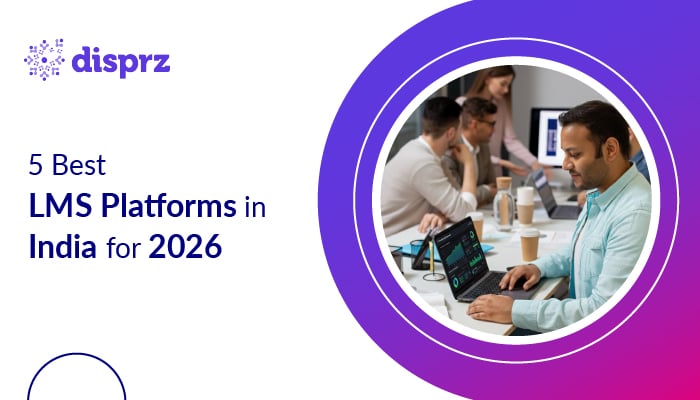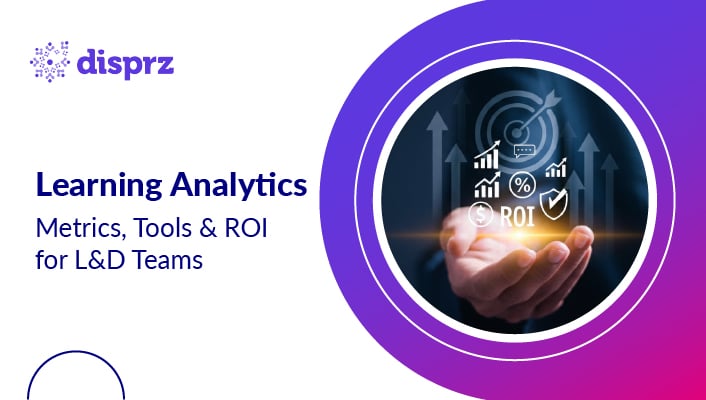What is White Label LMS?
White-label Learning Management Systems (LMS) empower organizations to rebrand and customize the platform, delivering a personalized learning experience under their own brand, despite being developed externally.
A study reveals that 75% of consumers remember a brand by its logo, and 50% are more likely to buy from an organization with a recognizable logo. By using a white-label LMS, organizations can enhance brand recognition and build trust and loyalty among their learners by offering a consistent and professional learning environment that feels uniquely their own.
Need for White-Labeled Learning Management System
While a traditional LMS offers basic benefits, it lacks the extensive customization of a white-label LMS. Unlike standard platforms with generic designs, a white-label LMS lets you fully tailor the learning environment to reflect your brand consistently.
Explore the many compelling advantages of choosing a white-label LMS.
Facilitates personalization
A key benefit of a white-label LMS is its extensive customization options. Unlike traditional platforms, it lets you fully personalize the learning environment without the vendor's branding. This allows you to tailor the experience to your specific needs.
Reduces cost
Extensive customization often comes with a high cost, but a white-label LMS offers a budget-friendly alternative. By rebranding a third-party platform, you get significant customization without the high expense of developing a system from scratch.
Boosts visibility
Aligning your academy with your brand image ensures consistent exposure to your organization, reassuring learners of the source and helping new users recognize your brand.
Strengthens reputation
Featuring your brand's name and imagery in training content shows your team's industry expertise. Aligning learning resources with your brand positions your organization as both a provider and a trusted expert.
5 Benefits of using a White-Label LMS platform
1. Eliminates inefficient processes and saves time
White-label platforms enable you to focus on growing your business instead of getting caught up in the complexities of course design, development, and management.
2. Offers branded online courses
Creating engaging courses is one thing, but ensuring they have a polished, professional appearance is another challenge. With just a few adjustments, you can make sure that your white-label online platform embodies your brand's unique identity.
3. Reduces costs by eliminating unnecessary expenditures
Private-label platforms with white label eLearning platforms come with built-in configurable options that can be adjusted upon login. With ready-made templates, they streamline customization and provide ease of use.
4. Supports businesses with unique requirements
White-label platforms are designed to address specific business needs, whether you’re offering training in fields like design, coding, health, or finance. For more tailored solutions, advanced plans provide the flexibility to customize features to better suit your unique requirements.
5. Enhances the organization's brand and corporate culture
Thorough training and engagement boost employee retention and satisfaction. Using white-label LMS software for corporate training can enhance organizational culture and improve workforce satisfaction.
8 Key Features of a Best White Label LMS 2025
1. Ease of use
2. Integration via API
3. Customization
4. Community support
5. Media formats
6. Mobile app or mobile-friendly interface
7. Certificates and gamification
8. Security
When selecting an online white-label platform, it's crucial to ensure it includes certain key features. The absence of these essential components can be a major red flag, so keep an eye out for them during your search.
1. Ease of use
One of the most important aspects of a white-label solution is its simplicity. The platform should be easy to navigate for both customers and end-users, ensuring a smooth and hassle-free experience.
2. Integration via API
Don’t limit yourself to the software’s built-in features alone. Enhance your academy's functionality by integrating APIs from widely used applications such as Zoom, Calendly, Meet, Stripe, Slack, and others.
3. Customization
White labeling allows you to customize the product to align with your brand's identity. You can modify elements such as the logo, color scheme, fonts, and button styles. Additionally, you have the option to change the language or add new ones as needed.
4. Community support
White-label online platforms include community support features that allow course participants to interact and share ideas, opinions, and resources. This connection among learners enhances the value and appeal of the course.
5. Media formats
To effectively launch your white-label training courses, make sure to include a variety of media formats, such as text, PDFs, videos, and infographics. This diverse range is essential for any white-label learning platform.
6. Mobile app or mobile-friendly interface
A functional and effective mobile app ensures accessibility and consistency. Developing a mobile application or using a mobile-friendly interface can significantly enhance your reach.
7. Certificates and gamification
Boost the attractiveness of your academy by integrating gamification features. Offer users various levels and badges to recognize their achievements and progress.
8. Security
A white-label online course platform provides robust security measures to safeguard data from unauthorized access. It includes features such as data encryption, restricted access to specific course areas, and monitoring of user activity to ensure comprehensive protection.
Possibilities of White Label LMS in 2025
A white-label LMS provides superior personalization compared to a standard branded LMS. Unlike basic branded options that only allow minor aesthetic changes, a white-label LMS lets you fully customize design and user experience to align with your brand.
Here are some elements of white-label courses that you can customize
Headers and footers
-
You can fully customize headers and footers by adjusting styles, resizing and repositioning the logo, and modifying navigation links. This allows you to design them to perfectly match your brand and needs.
Cover pages
-
A white-label LMS lets you fully customize cover pages for different courses or learning paths, ensuring a cohesive and branded experience for learners.
Course cards
-
Course cards provide learners with an overview of each course and assist in navigating to their desired options. With a white-label LMS, you have complete authority over the design and content of these course cards. You can decide what details are included, the extent of information displayed, the styling, and other customization aspects.
Fonts
-
You have full control over the fonts used on your white-label online course platform, allowing you to choose any font or combination that aligns with your brand. This customization, while subtle, effectively reinforces your brand’s visual identity and helps make the content feel more cohesive and recognizable to your users.
Buttons
-
Even seemingly minor elements, such as buttons, can significantly influence the user experience of your learners. A white-label LMS allows you to fully customize the appearance of these buttons, including their color, text, size, and other design aspects, ensuring they align perfectly with your academy's branding and enhance navigation.
Tips to choose the Best White Label LMS
Selecting the right white-label LMS requires evaluating key factors to ensure an effective learning experience.
Here are the tips below
1. User-friendliness
Ensure the LMS is intuitive for both administrators and learners, simplifying course creation, management, and navigation for an effective learning experience.
2. Mobile learning capabilities
Choose a mobile-friendly platform or a robust mobile app to enable access to training materials anytime, anywhere, promoting continuous learning.
3. Support for various media formats
Select an LMS that supports multiple media formats, such as text, videos, PDFs, and infographics, to cater to different learning styles and maintain high engagement.
4. Reliable support
Opt for an LMS with responsive customer support to quickly address issues, ensuring smooth operation and minimal disruptions to learning.
5. Integration capabilities
Look for an LMS that integrates seamlessly with tools like Zoom, Stripe, or Slack to enhance functionality and create a cohesive learning experience.
6. Security measures
Ensure the LMS provides robust security features, including data encryption, access controls, and user activity monitoring, to protect sensitive information.
Conclusion
Choosing the right white-label LMS can transform your training programs by offering enhanced customization and a cohesive brand experience. By leveraging its advanced features, you can create a more engaging and effective learning environment tailored to your needs.
Ready to see how a white-label LMS can elevate your training programs?
Book a demo today to explore its full potential!








